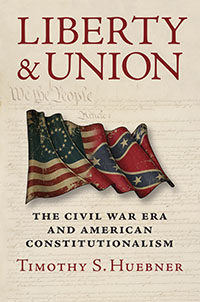Rights and Revolutions
Historian Timothy S. Huebner discusses how a “culture of constitutionalism” shaped the Civil War era
FROM THE CHAPTER 16 ARCHIVE: In conjunction with Humanities Tennessee’s exhibition tour of Voices and Votes: Democracy in America, Chapter 16 is revisiting coverage of notable books on civil rights and the foundations of a democratic society. This article originally appeared on June 13, 2016.
***
In Liberty and Union, an impressive new narrative of the Civil War era, Timothy S. Huebner feeds three streams of historical interpretation. First, he emphasizes the revolutionary impact of the Civil War upon American life, arguing that because of the South’s deep investment in slavery, only war could have destroyed that terrible institution. Second, he demonstrates that a “culture of constitutionalism” suffused popular thought during the nineteenth century—Unionists and Confederates alike defended their stances by connecting them to the Founding Fathers, the Declaration of Independence, and the United States Constitution. Finally, Huebner maintains that the key African-American struggles of the period (abolitionism, emancipation, and post-war politics) all shared the language of constitutionalism, which shaped the freedmen’s contribution to the changing political landscape.
 Huebner is the Irma O. Sternberg Professor of History at Rhodes College in Memphis and the author of books on the Southern judiciary, the Supreme Court, and American constitutional history. He answered questions about Liberty and Union via email:
Huebner is the Irma O. Sternberg Professor of History at Rhodes College in Memphis and the author of books on the Southern judiciary, the Supreme Court, and American constitutional history. He answered questions about Liberty and Union via email:
Chapter 16: If we understand the “culture of constitutionalism,” as you put it, does it shed any light on why the South seceded?
Timothy S. Huebner: Yes, it does. Historians often say that the Civil War was about slavery. But what we really mean is that the Southern states seceded to protect slavery. More precisely, in the context of a culture of constitutionalism, white Southerners framed their interest in slavery as a “rights” question. They seceded from the Union because they believed that their rights—their rights as slaveholders—would be violated under a Republican administration. This is not an easy concept for twenty-first century Americans to get their heads around. We cannot stomach the hypocrisy of Southern slaveholders thinking in terms of their “rights” to hold other human beings in bondage. But at the time, remarkably, the mainstream national political debate focused much more on the rights of slaveholders than it did on the rights of the enslaved.
Despite the Supreme Court’s decision in Dred Scott v. Sandford, white Southerners feared that Abraham Lincoln would not respect these rights. Secession, then, in the white Southern mind, became a way to protect slaveholders’ rights under the Constitution.
Chapter 16: A trickier question might be: Why did the Northern states fight to preserve the Union? It seems like a lot of sacrifice and carnage for the sake of a principle.
Huebner: This may be the most difficult question in all of Civil War historiography, and it is one that has received surprisingly little attention. Why not just let the Southern states secede?
Only if we understand the culture of constitutionalism does the North’s behavior make any sense. If you read Northern newspapers at the time or if you look at the rhetoric of Northern Republicans (and many Northern Democrats) during the secession crisis, you realize that they really believed that they had inherited something unique from the Founding Fathers. Most Northerners in 1861 believed that the United States embodied a set of constitutional ideals that were in danger of being destroyed. This is why Lincoln linked secession to anarchy. He believed that allowing a faction within the Union to separate from it would undermine the entire American experiment in constitutional government. Americans in the Northern states were willing to go to war over these deeply held principles.
Chapter 16: How did Union and Confederate soldiers perceive what they were fighting for? Did they, too, speak the language of rights?
Huebner: This is an important question, about which historians have spilled a great deal of ink. In some ways it is impossible to say definitively what the three million men who fought in the war were thinking, of course. We cannot exactly boil their thoughts down to a few sentences.
 Nevertheless, the Union and Confederate Armies were the most literate in history to take the field at that time, and they left behind an enormous written record for historians. From those letters and diaries, we can clearly see that Civil War soldiers were deeply concerned with questions of liberty and constitutional government. It is remarkable, in this sense, how closely the thoughts of enlisted men mirrored those of their political leaders.
Nevertheless, the Union and Confederate Armies were the most literate in history to take the field at that time, and they left behind an enormous written record for historians. From those letters and diaries, we can clearly see that Civil War soldiers were deeply concerned with questions of liberty and constitutional government. It is remarkable, in this sense, how closely the thoughts of enlisted men mirrored those of their political leaders.
Most Northern soldiers saw themselves engaged in a great struggle to preserve the Union—the uniquely American experiment in constitutional liberty that, they thought, stood as an example to the world. Most Southern soldiers saw themselves as fighting for their ability to govern themselves and to prevent what they saw as the imposition of Northern, Republican tyranny. White Southerners’ notions of rights clearly included the right to own slaves, a right which rested on a commitment to white supremacy.
Chapter 16: Abraham Lincoln was buffeted by Democrats on one side and radical Republicans on the other. As he waged a war, navigated these challenges, and adapted his own political outlook, was the Constitution his weapon or his burden?
Huebner: More than any of his predecessors, Lincoln was a constitutionalist. He struggled with this. The historical record shows that Lincoln was personally against slavery. Yet in his First Inaugural Address, he acknowledged the rights of slaveholders to hold slaves in the South and to reclaim fugitive slaves in the North. In this sense, he saw himself as constrained by the Constitution.
But he later came to the conclusion that the rebellion, as he called it, could serve as the means of enlarging executive power, so as to preserve the republic and take action against slavery. Lincoln believed that he possessed the authority, for example, to suspend the writ of habeas corpus in wartime in order to prevent the rebels from destroying the Union. Later, working with a Republican Congress, the Lincoln administration pursued a series of steps to whittle away at the constitutional foundations of slavery, and the president eventually issued the Emancipation Proclamation.
So if the Constitution began as his burden, it eventually became his weapon. Lincoln ended up using the power that he believed the Constitution granted him in wartime to take extraordinary steps to bring about change.
Chapter 16: How could Confederates revere the United States Constitution and then form their own government, with their own constitution? Did fighting a war force any reconsideration of their political principles?
Huebner: The remarkable thing about the creation of the Confederacy was that it was simultaneously revolutionary and conservative. Secession was a radical act, borne of a deep belief that the American experiment had failed because the U.S. Constitution had neglected to protect their rights as slaveholders. The election of a purely sectional candidate—Lincoln—to the highest office in the land showed, in their minds, how the government had failed them.
And yet, when Southerners assembled to write a new constitution, they replicated the old one almost exactly! In this sense, they proved profoundly conservative. They changed the Preamble a bit, added a few innovations regarding congressional and executive power, and wrote the right of slaveholding into the constitutional text. That’s it. The structure was the same: three branches, a two-house legislature, and a court system (although they never got around to creating a supreme court).
The biggest constitutional challenge for the Confederacy became how to preserve state sovereignty, which the Confederate Constitution referred to in its Preamble, while at the same time establishing the type of centralized government required for fighting a war.
Chapter 16: You argue that African Americans helped bring about a constitutional revolution. How so?
Huebner: This is, in many ways, the most important story of all. From the start, African Americans pushed the issue of freedom. For decades, beginning in the late-eighteenth century, free blacks in the North had asserted their rights as men and as Americans. Absalom Jones, in a famous petition to Congress in 1793, argued that, “as we are men,” African Americans could claim their “liberties and unalienable rights.” Decades later, free blacks began assembling regularly in conventions and issuing resolutions claiming all of the rights of other Americans under the Constitution. Enslaved African Americans in the South also pushed the limits—many escaped to federal military outposts even before the Union government had taken its first antislavery action. So African Americans continually advocated an agenda of freedom—not just emancipation but their full panoply of rights under the Declaration of Independence. When emancipation came, it came largely because of their persistent efforts in pushing this agenda, and, in wartime, in walking off plantations and enlisting in the U.S. military.
These continued attempts to claim America’s heritage of liberty—I call it “black constitutionalism”—helped to bring about a constitutional revolution. In the 1859 case Ableman v. Booth, the Supreme Court upheld in nationalistic language the rights of slaveholders to recapture fugitive slaves. Who could have imagined then that within a dozen years the full force of the federal government would be used for the opposite purpose—to uphold the voting rights of African Americans, those who had been described in the Dred Scott decision as having “no rights” at all? In this sense, African Americans helped create a new discourse of rights in America—one that focused not on the rights of slaveholders but on the rights of formerly enslaved people.

Aram Goudsouzian chairs the history department at the University of Memphis. His most recent book is Down to the Crossroads: Civil Rights, Black Power, and the Meredith March Against Fear.




